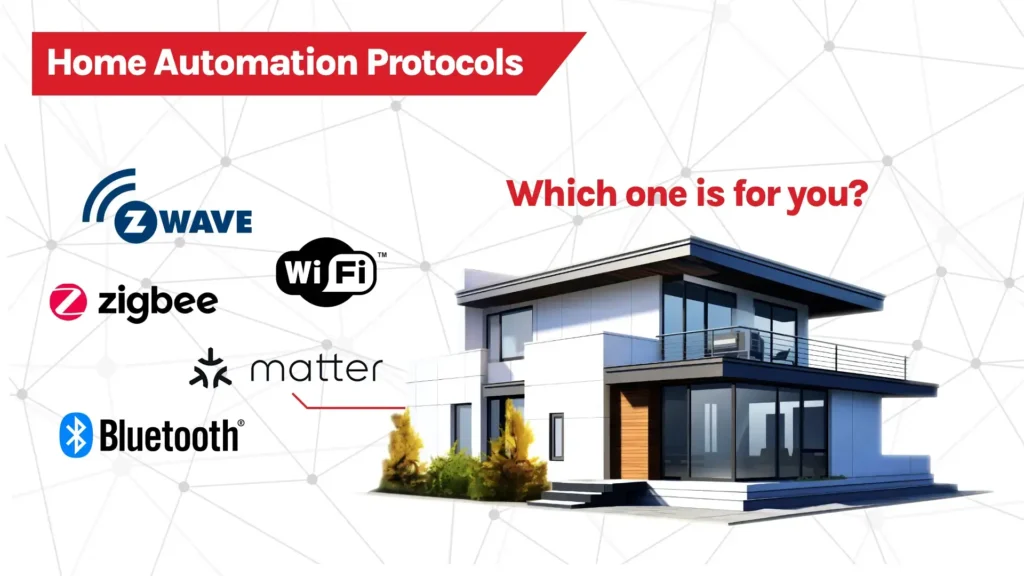
Imagine controlling your lights, thermostat, and security system with a single tap on your phone, all working seamlessly together. Sounds like magic, right? Well, it’s not—it is the power of home automation protocols. These are the invisible highways that let your smart devices communicate, making your home more convenient, efficient, and secure.
As an experienced Elv system integrators, we’re passionate about helping Dubai homeowners create smart homes that fit their lifestyles.
In this guide, we’ll break down everything you need to know about home automation protocols, why they matter, and how to pick the right one for your home.
What Are Home Automation Protocols?
Home automation protocols are like the languages your smart devices speak to work together. They’re the rules and technologies that allow your smart lights, locks, cameras, and thermostats to connect, share data, and respond to your commands. Without the right protocol, your devices might as well be speaking different dialects, leading to confusion or no communication at all.
In 2025, the world of smart homes is buzzing with options, but choosing the right protocol can make or break your setup. Whether you’re upgrading your villa in Dubai or setting up a cozy apartment, understanding these protocols ensures your devices work in harmony. Let’s dive into the most popular ones and what makes them unique.
Why Do Home Automation Protocols Matter?
Before we explore the types, let’s talk about why protocols are so important:
- Seamless Connectivity: A good protocol ensures your devices talk to each other without glitches, creating a smooth user experience.
- Compatibility: Not all devices work with every protocol. Picking the right one ensures your smart home gadgets are compatible.
- Security: Strong protocols protect your data and prevent unauthorized access. Curious about keeping your smart home safe? Check out our post on Worried About Smart Home Security? Here’s What You Must Do.
- Scalability: Want to add more gadgets later? The right protocol makes it easy to expand your system. Learn more about the latest devices in our guide to Top Home Automation Gadgets to Upgrade Your Smart Home in 2025.
We help you choose protocols that align with your needs, ensuring your smart home is both functional and future-proof.
Popular Home Automation Protocols in 2025
There are several protocols out there, each with its own strengths. Here’s a breakdown of the most common ones you’ll encounter:
1. Wi-Fi: The Familiar Choice
Wi-Fi is the backbone of many smart homes because it’s already in most households. It’s fast, reliable, and supports high-bandwidth devices like cameras and smart TVs.
Pros:
- Works with many devices, from smart speakers to doorbells.
- No extra hub needed—just your home router.
- Great for streaming and data-heavy tasks.
Cons:
- Can drain device batteries faster.
- May clog your network if you have many devices.
- Security depends on your Wi-Fi network’s strength.
Best for: Homes with high-speed internet and devices like smart TVs or cameras. If you’re curious about setting up Wi-Fi for your smart home, explore our Data Points services.
2. Zigbee: The Energy-Saving Team Player
Zigbee is a low-power protocol that creates a mesh network, meaning devices can relay signals to each other, extending range and reliability.
Pros:
- Energy-efficient, perfect for battery-powered devices like sensors.
- Supports many devices without overloading your Wi-Fi.
- Mesh network boosts range and stability.
Cons:
- Requires a hub or bridge for most setups.
- Not as fast as Wi-Fi for data-heavy tasks.
Best for: Homes with lots of small devices like lights, sensors, or smart locks. Want to know what devices make up a smart home? Read our Components of a Home Automation System: A Complete Guide by SEFA Experts.
3. Z-Wave: The Long-Range Champion
Z-Wave is similar to Zigbee but uses a different frequency, making it less likely to interfere with Wi-Fi or other devices. It’s also a mesh network protocol.
Pros:
- Excellent range, ideal for larger homes or villas in Dubai.
- Highly secure with strong encryption.
- Supports a wide range of devices.
Cons:
- Needs a dedicated hub.
- Fewer compatible devices compared to Wi-Fi or Zigbee.
Best for: Spacious homes or setups needing reliable, long-range connections.
4. Bluetooth: The Close-Range Connector
Bluetooth is great for devices that don’t need constant internet access, like smart locks or speakers.
Pros:
- Low power consumption, good for battery life.
- No hub required for basic setups.
- Secure for short-range communication.
Cons:
- Limited range (typically 10-30 meters).
- Not ideal for large homes or many devices.
Best for: Small apartments or single-device setups like smart locks.
5. Matter: The Future of Smart Homes
Matter is a new protocol gaining traction in 2025. It’s designed to make devices from different brands work together seamlessly, reducing compatibility headaches.
Pros:
- Universal compatibility across brands like Google, Amazon, and Apple.
- Works with Wi-Fi, Thread, or Ethernet for flexibility.
- Strong focus on security and local control.
Cons:
- Still new, so not all devices support it yet.
- May require updating older devices.
Best for: Future-proofing your smart home. If you’re wondering how to pick the right system, check out our guide on how to Choose the Right Home Automation System for Your Home.
How to Choose the Right Protocol for Your Home
Picking the best protocol depends on your home’s size, your devices, and your goals. Here are some tips to help you decide:
- Assess Your Needs: Do you want a few smart lights or a full system with cameras, locks, and sensors? For complex setups, Zigbee or Z-Wave might be better. For simple setups, Wi-Fi or Bluetooth could work.
- Consider Your Home’s Size: Larger homes benefit from Z-Wave’s range or Zigbee’s mesh network. Smaller spaces can rely on Wi-Fi or Bluetooth.
- Check Device Compatibility: Make sure your gadgets support the protocol. Matter is great for mixed-brand setups, but check if your devices are Matter-certified.
- Prioritize Security: Protocols like Z-Wave and Matter offer strong encryption, keeping your home safe.
- Think About Scalability: Planning to add more devices? Choose a protocol like Zigbee or Matter that supports expansion without slowing down your network.
Not sure where to start? Our Sefa’s Integrated Security Systems experts can design a custom home automation system tailored to your needs, from selecting the right protocol to installation.
Common Challenges with Home Automation Protocols
Even the best protocols have quirks. Here’s what to watch out for:
- Interference: Wi-Fi and Bluetooth can face interference from other devices. Zigbee and Z-Wave use different frequencies to avoid this.
- Hub Dependency: Zigbee and Z-Wave need hubs, which add cost but improve reliability.
- Compatibility Issues: Mixing protocols can cause headaches. Matter aims to solve this, but it’s not fully adopted yet.
- Setup Complexity: Some protocols require more technical know-how. That’s where Sefa’s home automation services come in—we handle the setup so you don’t have to.
Why Trust SEFA for Your Home Automation Needs?
Sefa Security Systems have been transforming Dubai homes into smart homes for over 20 years. Our SIRA-approved team specializes in creating systems that are secure, reliable, and easy to use. Whether you’re curious about Zigbee’s mesh network or want to future-proof with Matter, we’ll guide you every step of the way.
Ready to build your dream smart home? Contact us today at +971 4 397 9912 or email us at office@sefa.ae. Let’s make your home smarter, safer, and more efficient with the perfect home automation protocol.
Final Thoughts
Home automation protocols are the key to a connected, convenient smart home. Whether you choose Wi-Fi for simplicity, Zigbee for efficiency, Z-Wave for range, Bluetooth for small setups, or Matter for future-proofing, understanding these options empowers you to create a system that works for you.
Have questions about setting up your smart home in Dubai? Reach out to Sefa Security Systems for a free consultation!


